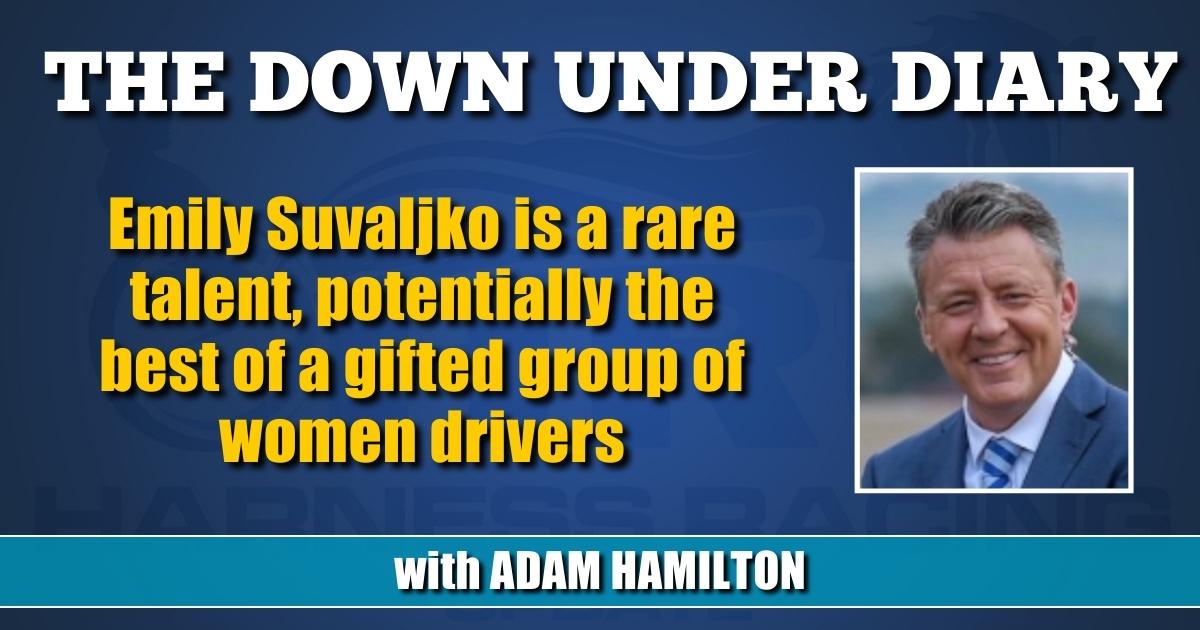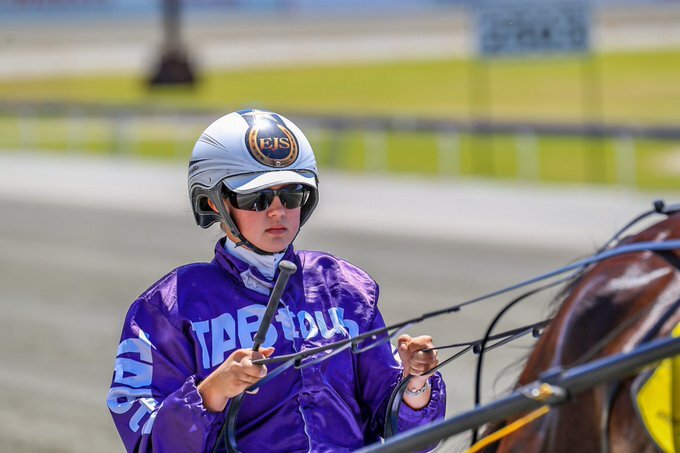Emily Suvaljko is a rare talent, potentially the best of a gifted group of women drivers
by Adam Hamilton
Girl power continues to grow Down Under.
Women have long been major players in Australia’s driving ranks, but the past few years have seen that go to a whole new level.
The first real game-changer for female drivers was Kerryn Manning, who re-wrote just about every record, not just for women, but all drivers, across Australia in the late 1990s and early 2000s. She won five national drivers’ premierships from 2000-2005.
Before that, Manning famously travelled to Europe with her father’s grand old trotter Knight Pistol and won the Group 1 Harley Davidson Trot in Norway in 1997. She became only the second woman to win a Group 1 race in Europe.
There were other fantastic female drivers around that time. Jodi Quinlan and Kellie Kersley both won Australia’s premier speed test, the Miracle Mile.
But still most tracks only had make-shift women’s drivers’ rooms and they were far outnumbered by the men.
How times have changed.
Over the past decade, women have become major players in every Australian state and regularly compete and beat the guys in our biggest races.
There’s none bigger now than Kate Gath, who has beaten the boys to win the past two Victorian metropolitan drivers’ premierships.
Gath was one of three women on last year’s Australian top 10 drivers’ list. The others were South Australia’s Danielle Hill and Western Australia’s 21-year-old Emily Suvaljko.
Suvaljko is a rare talent, potentially the best of the lot.
Think about this. Just a few weeks ago, Suvaljko was one of four female drivers in WA’s biggest race, the $A450,000 Group 1 WA Pacing Cup. The others were: Deni Roberts, Jocelyn Young and Maddison Brown.
Before that, only a total of four women drivers had ever driven in the race. That’s remarkable.
Suvaljko has been a revelation. It’s only four years since she drove her first winners and she’s already posted more wins (almost 350) than any other woman in WA history. She is the first WA woman to drive more than 100 wins in a season (last season).
“I saw that come up in my Facebook memories the other day… my first winner,” she said. “I do have to pinch myself to think how far I’ve come in what feels a short amount of time.”
The diminutive Suvaljko snared her first Group 1 win on Savvy Bromac in the WA Mares’ Classic last November for her “boss”, trainer Nathan Turvey and she went within a whisker of a winning that WA Pacing Cup a few weeks ago for Turvey on Miracle Moose – beaten in the last-stride by Wildwest.
“I thought I’d won. I gave a victory salute and copped a suspension for. It’s always been my worst nightmare, to celebrate thinking I’d won when I hadn’t. I knew I had them beaten all around me, but it (my) Uncle Callan who shot up along the inside and beat me right on the line,” she said.
The WA Cup has been bittersweet for Suvaljko. She’s unlucky not to have already won the race. Twelve months earlier, she was booked to drive outsider Vultan Tin in the Cup, but a two-week suspension sidelined her. Instead, her father Shannon took the reins and won.
It stung her. She couldn’t watch the race live and admitted to the West Australian newspaper’s Steve Butler: “I was happy for dad, but it took me about a week or so to be really happy for him.”
Shannon said it was clear from a very early age Emily was a natural with horses.
“Since she was two years old she wanted to lead horses in the paddock. She was never afraid of horses and just loved them. She always naturally sat in the cart and didn’t panic and just has always had that natural calmness about her. She’s come a long way, she has done all the hard work and I’m very proud of her.”
Thanks to those trailblazing women before her, Suvaljko rarely thinks about being a woman in a once male-dominated sport.
“Maybe early-on I thought the boys ganged up on me a bit, but I’m sure now I get the same opportunities any of the guys do,” she said.
“There are reminders though. Like going to Gloucester Park (Perth’s major track) each week. The boys have this big and terrific driver’s room, while we (women) have a tiny room with two showers and a couple of benches. There are four, five or six of us there each week now and we’re pushing for a new room.”
The tight travel restrictions of Covid have clamped Suvaljko’s ability to gain experience outside of her home state for the past couple of years, but she can’t wait to try it again.
“That first Lady Drivers’ series I competed at in Queensland and then another one in Tasmania, they were fantastic. I got to meet some of the greats like Kerryn Manning and Kate Gath,” she said. “I swear that was some of the most competitive racing I’ve been in. There’s no doubt women are more competitive against each other like that than men.
“The chance to drive against them and then socialise and chat afterwards was really special.”
Suvaljko openly admits she is fiercely competitive and, as such, has become a real goal-setter.
“Morgan Woodley re-wrote all the records in WA before me, and I knocked a few of them off already. The next one is the fastest to get 500 (wins). Alan Parker, who is the historian over here, set me the challenge, I need about another 130 wins by February next year to beat Morgan’s record. I’ll be throwing everything at that.”
The stunning emergence of Suvaljko is the just the latest sign that it won’t be long until there are as many women at the top of Australia’s driving ranks as there are males.
And that’s downright refreshing.


















